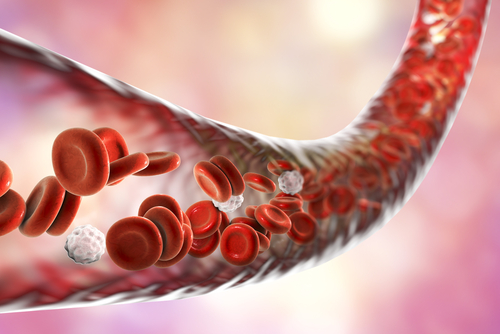Protein Myeloperoxidase May Lead to Worse Outcomes in AAV Patients
Written by |

The protein myeloperoxidase (MPO) may increase the activation of neutrophils — key immune cells in ANCA-associated vasculitis — and heighten vascular injury in patients, a new study shows.
The study, “Myeloperoxidase influences the complement regulatory activity of complement factor H,” was published in the journal Rheumatology.
ANCA-associated vasculitis (AAV) is a group of autoimmune diseases characterized by the presence of autoantibodies against proteins that are present on neutrophils, a type of immune cell. In particular, patients with AAV have high levels of antibodies against either Proteinase 3 (PR3) or MPO, which cause the immune system to attack neutrophils, leading to injury.
The alternative complement system is a major component of the immune system’s natural defense against infections. The alternative pathway is triggered when the C3b protein directly binds a pathogen, resulting in pathogen destruction. Several studies have demonstrated a link between the activation of the alternative complement pathway and AAV.
Interestingly, the alternative complement pathway is known to amplify the activation of neutrophils. This leads to the presence of more neutrophils that could be attacked by autoantibodies, which amplifies the damage in AAV.
Complement factor H (FH) is a negative regulator of the alternative complement pathway. It plays a role in degrading the C3b protein, which leads to reduced activation of the alternative complement pathway.
Recent studies have suggested a potential role for FH in the development of AAV, which has led researchers to investigate whether MPO interacts with FH and influences its regulatory activity.
Researchers now have discovered that FH and MPO lay in the same location in neutrophil extracellular traps (NETs) — a type of DNA net that neutrophils release to bind pathogens. Researchers also showed that MPO was located close to FH in kidney biopsies, a common site of injury in AAV. These results indicate that MPO and FH likely interact.
So, researchers hypothesized that MPO and FH bind to each other. Through a series of experiments, they showed that was the case.
Naturally, researchers set out to determine the significance of MPO and FH binding. They discovered that MPO actually inhibited the interaction between FH and C3b, which reduced the degradation activity of FH. This led to higher levels of C3b, which eventually led to higher levels of neutrophil activation.
Higher levels of neutrophil activation means more available MPO, which can be attacked by autoantibodies against MPO and lead to worse disease conditions.
“Our findings indicate that MPO binds to FH and influences the complement regulatory activity of FH. MPO-FH interaction may participate in the pathogenesis of AAV by contributing to activation of the alternative complement pathway,” investigators concluded.
In a editorial that was published in Rheumatology in May, Peter Heeringa and Mark Alan Little propose that the next question to be asked on this subject is whether the influence of MPO on FH is specific to AAV, or whether it can occur in other inflammatory diseases.
“Future studies must include adequate disease controls, including those with similar non-ANCA-mediated multi-system autoimmune disorders characterized by kidney dysfunction (such as anti-GBM disease), and those receiving immunosuppressive medication,” they suggest.





